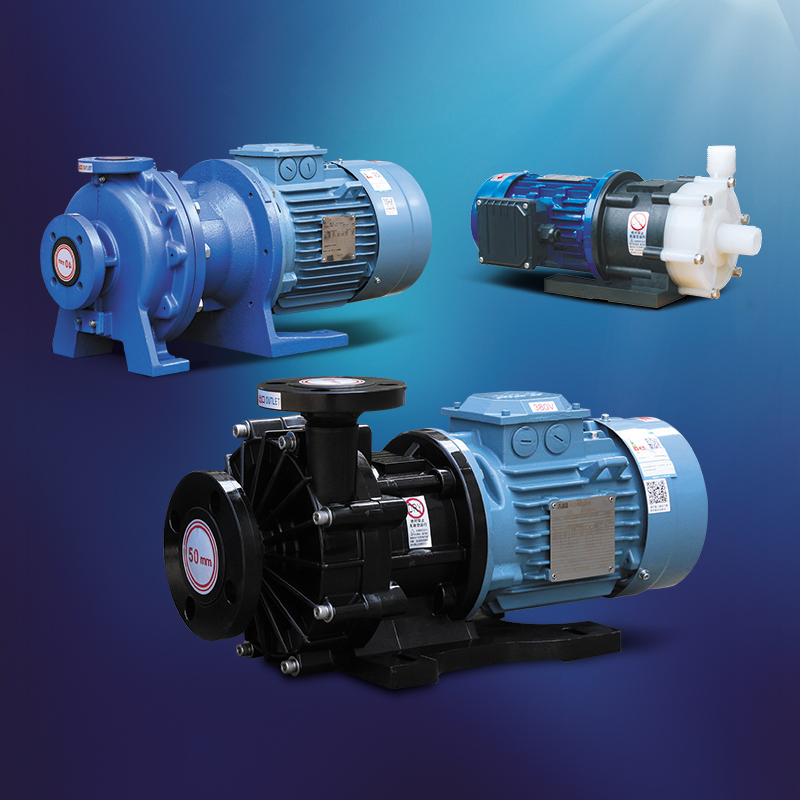When it comes to transferring corrosive chemicals, centrifugal magnetic drive pumps are often the preferred choice for many engineers. Here’s why:
Magnetic Pump Features
Seal-less Technology
Most pumps use a direct drive mechanism, which requires seals on the shaft to prevent leaks. Magnetic drive pumps, on the other hand, use a neodymium magnet attached to the motor shaft that rotates synchronously with the impeller. This magnetic connection eliminates the need for seals and prevents leaks.
Chemical Resistance
Centrifugal magnetic drive chemical pumps are usually made of corrosion-resistant materials, allowing them to withstand even the harshest chemicals and conditions both inside and outside.
Durability
The design and materials of construction of magnetic drive pumps make them durable and reliable, even in applications involving the transfer of harsh chemicals, possible dry runs, and other challenges.
Low Maintenance
Magnetic drive pumps require little to no maintenance to provide optimal performance over the long term, potentially up to several years at a time. The lack of mechanical seals means there are no seals to replace periodically due to wear or corrosion caused by chemical attack.
Magnetic drive pumps provide an efficient, reliable, and safe way to transfer corrosive chemicals. With their seal-less technology, chemical resistance, durability, and low maintenance, they are a compelling choice for any corrosive chemical transfer application.
Types of Centrifugal Magnetic Drive Pumps
When choosing a pump for your application, many factors come into play. Adding sealing options to the mix can further complicate the decision-making process. QEEHUA PUMP can help make the selection process easier by providing expert recommendations based on your specific needs.
Advantages of Centrifugal Magnetic Drive Pumps
Centrifugal magnetic drive pumps offer many benefits when it comes to handling corrosive chemicals.
Improved Worker Safety
Mechanical seal pumps are prone to leaks, creating a safety hazard, especially when dealing with toxic or corrosive chemicals. A failed seal can release liquids or fumes over time, endangering workers. Magnetic drive pumps eliminate this risk, providing a safer environment for employees.
Increased Productivity
When a mechanical seal needs replacement, it can result in costly downtime. This process requires manual disassembly of the pump, seal replacement, and reinstallation. Operations are affected, potentially leading to line or system shutdown and risking production delays or losses. Magnetic drive pumps require little maintenance, leading to increased productivity and cost savings.
Preventing Unorganized Emissions
Facilities that use pumps for chemical delivery face the risk of volatile organic compound (VOC) and volatile hazardous air pollutant (VHAP) emissions. These emissions not only pose a risk to employees and the public but also risk compliance violations. Magnetic drive pumps prevent uncontrolled emissions, keeping facilities safe and compliant.
Corrosion Resistance
Magnetic drive pumps can withstand the most corrosive and hazardous fluids, making them ideal for challenging applications. Their durability and resilience make them suitable for fluids that are too harsh for other pump designs. Magnetic drive pumps offer a variety of options for tough jobs.
Centrifugal magnetic drive pumps have become the standard for corrosive chemical transfer because of their reliability and durability. Choosing a magnetic drive pump can reduce the complexity and cost of your next project, while improving safety and productivity.


